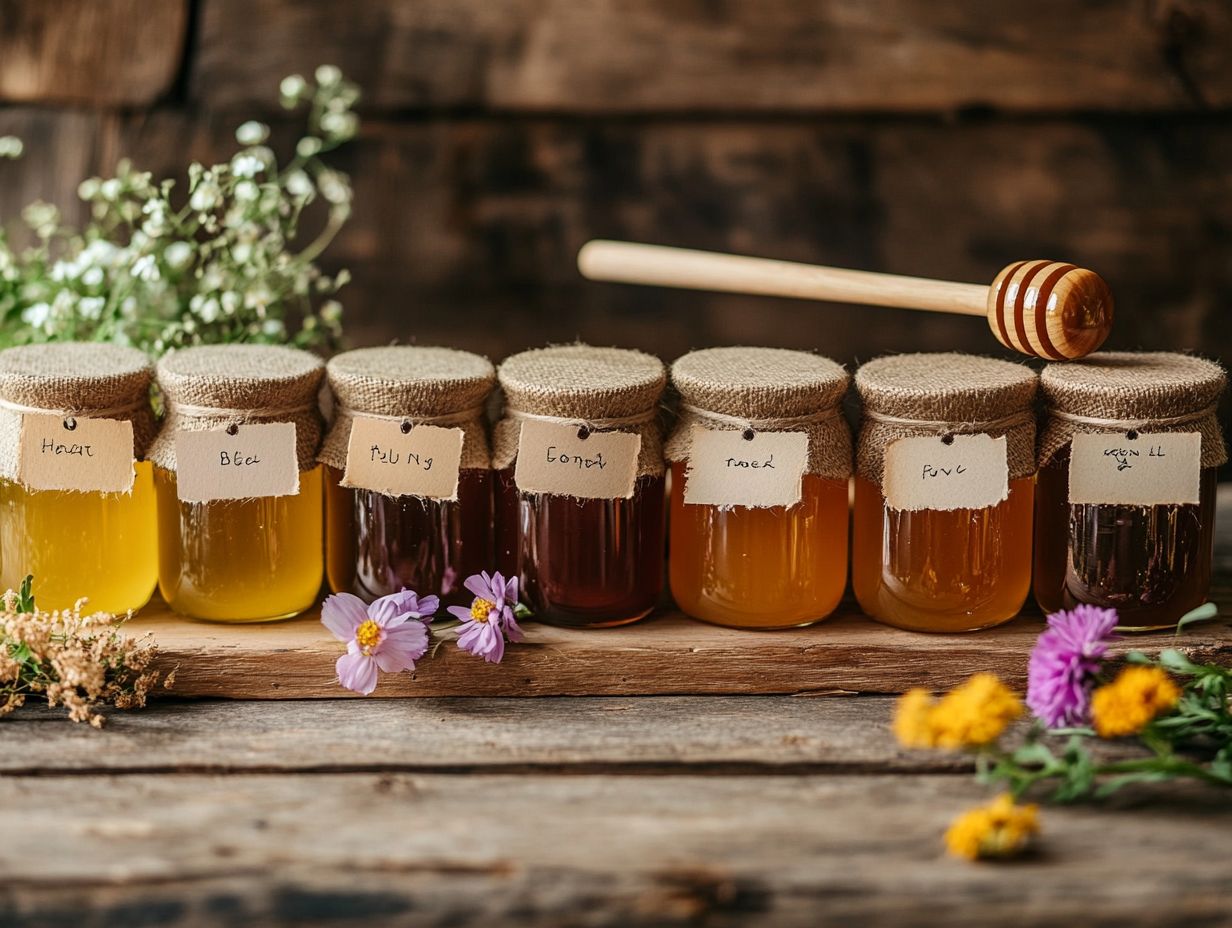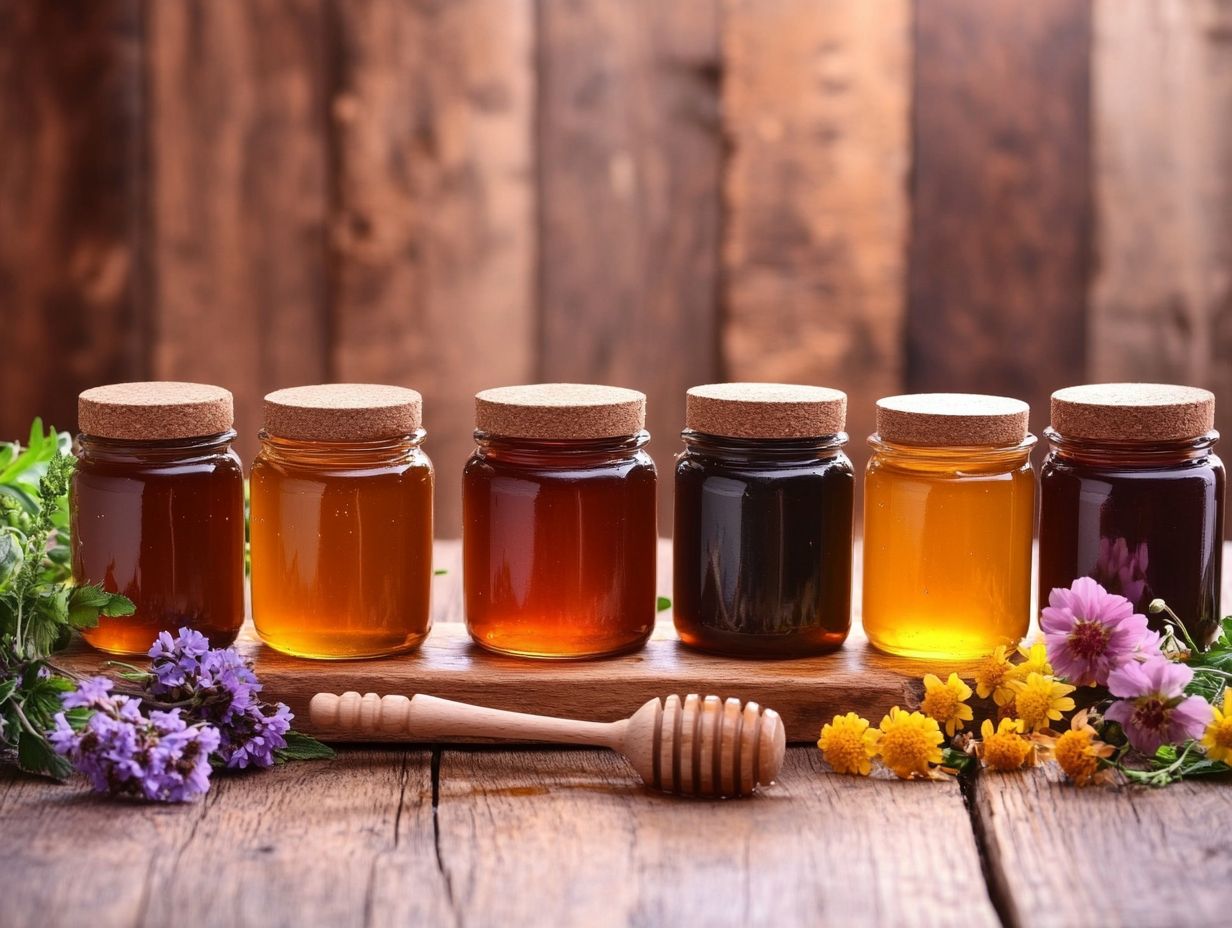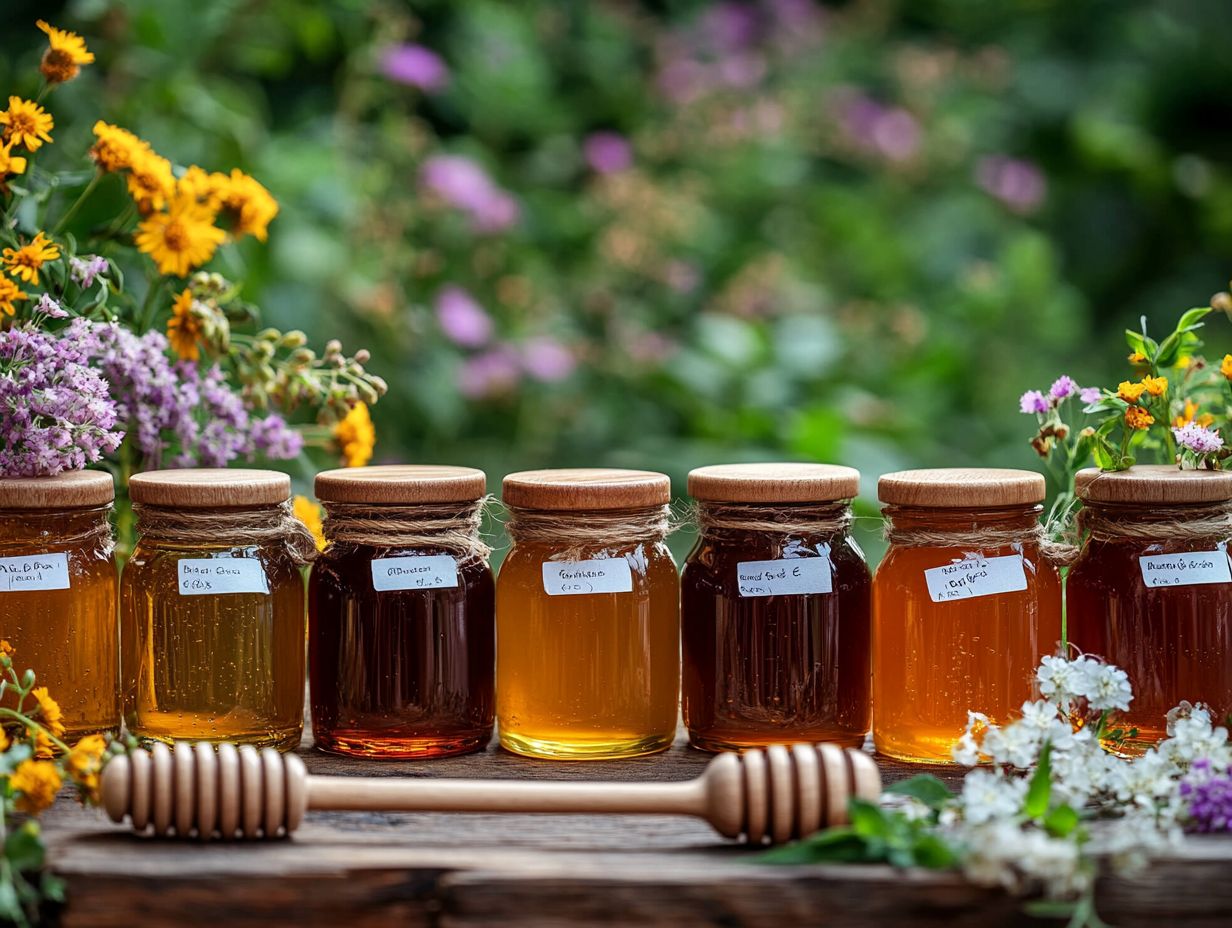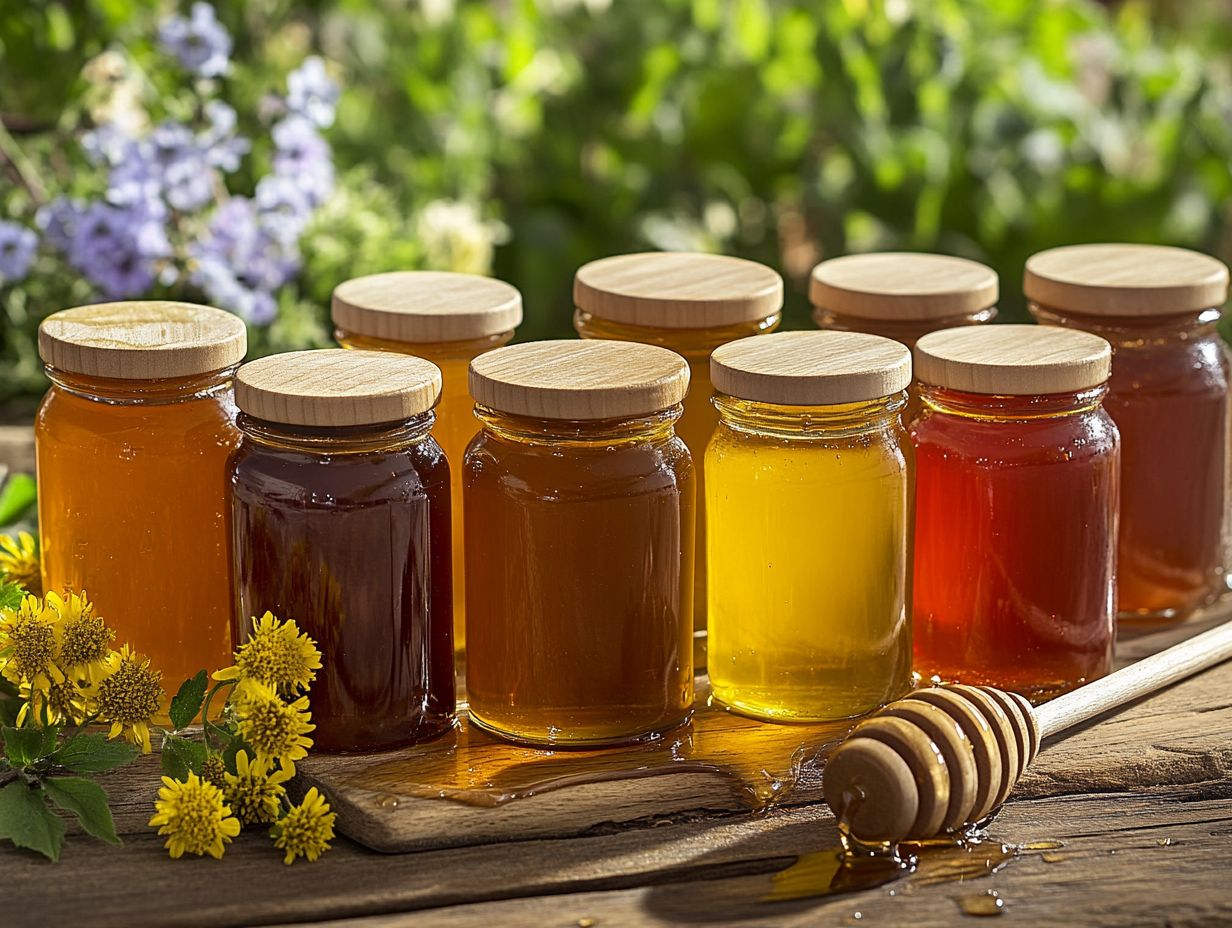Top 7 Honey Varieties You Should Know
Honey, especially raw honey, is more than just a sweet treat; it is a universe of flavors, health advantages, and culinary opportunities waiting for your exploration, distinct from artificial honey which lacks these beneficial properties.
Get ready to discover the amazing benefits of honey varieties! Explore seven exceptional honey varieties, each boasting its own unique characteristics and applications. From the remarkable healing properties of Manuka honey to the subtle sweetness of Orange Blossom honey and the mild taste of Acacia honey, uncover what differentiates these types of honey, learn how to seamlessly integrate them into your diet, and grasp their numerous health benefits.
Start exploring these delicious honey varieties today!
Contents
- Key Takeaways:
- 1. Manuka Honey
- 2. Acacia Honey
- 3. Clover Honey
- 4. Buckwheat Honey
- 5. Eucalyptus Honey
- 6. Orange Blossom Honey
- 7. Alfalfa Honey
- What Makes These Honey Varieties Unique?
- Frequently Asked Questions
- What are the top 7 honey varieties that everyone should know about?
- What is Manuka Honey?
- How is Acacia Honey Different from Other Varieties?
- What Makes Clover Honey a Popular Choice Among Honey Varieties?
- Is Buckwheat Honey Good for Your Health?
- What Are the Benefits of Eucalyptus Honey?
- Can Lavender Honey Be Used for More Than Just Sweetening Foods?
- Why is Orange Blossom Honey a Popular Choice for Skincare Products?
Key Takeaways:

- Explore the unique flavors and health benefits of the top 7 honey varieties, such as the antibacterial properties of Manuka Honey and the digestive benefits of Clover Honey, as well as the antioxidant-rich Buckwheat Honey.
- Incorporate these honey varieties into your diet for a natural and delicious way to boost your immune system and add a touch of sweetness to your meals, utilizing honey brands like Nature Nate s, Aunt Sue s, and Savannah Bee Company.
- From baking to marinades, each honey variety has its own distinct flavor profile and can be used in a variety of dishes to enhance taste and add natural sweetness, whether from brands like Honey Pacifica or 365 by Whole Foods Market.
1. Manuka Honey
Manuka Honey, known for its health benefits, is crafted by honey bees that pollinate the Manuka tree, primarily found in the breathtaking landscapes of New Zealand and Australia. This extraordinary honey often earns the title of superfood, thanks to its impressive antibacterial and anti-inflammatory qualities, making it a favored choice among health aficionados.
With its unique flavor and texture, Manuka Honey truly distinguishes itself from other honey varieties like clover, wildflower, and eucalyptus, offering a taste experience that elevates a range of culinary creations.
The extraordinary characteristics of Manuka Honey are measured by its Unique Manuka Factor (UMF) rating, a measure that shows how many beneficial compounds are in Manuka honey. This rating sets it apart from other honey types; while clover and eucalyptus honey are delightful in their own ways, they lack the same potent medicinal properties.
In terms of taste, Manuka Honey is often described as rich and robust, with earthy undertones that beautifully balance its sweetness, making it an exquisite addition to your teas or as a gourmet spread.
As more consumers become aware of its potential health benefits, including wound healing and digestive support, the global popularity of this exceptional honey continues to soar, driving up demand as more people seek to experience its unique advantages, supported by a robust honey production industry.
2. Acacia Honey
Acacia Honey is truly a gem, known for its light color and mild flavor that makes it the go-to choice for those who appreciate a gentle sweetness in their culinary creations. Its slow crystallization process allows it to remain liquid for an extended period, so you can seamlessly incorporate it into various recipes without worrying about clumping, making it superior to other crystallized honey types.
Packed with fructose, Acacia Honey offers a plethora of health benefits; it’s easy on your digestive system and serves as a quick energy source, making it an ideal companion for athletes and health-conscious individuals.
Its low glycemic index makes it suitable for various diets, especially for anyone managing blood sugar levels. When compared to other honey types like wildflower or clover, Acacia Honey distinguishes itself with a delicate taste that enhances the flavors of salad dressings, teas, and marinades, all without overwhelming them.
Its delightful sweetness serves as an excellent alternative to sugar in baking or when drizzled over breakfast favorites like pancakes and yogurt. By incorporating Acacia Honey into your daily meals, you not only elevate your culinary creativity but also support your overall well-being.
3. Clover Honey
Clover Honey is one of the world s most beloved types of honey, coming from honey bees that primarily pollinate clover plants. This delightful nectar showcases a distinct floral taste and a light amber hue that captivates the senses.
It s incredibly versatile in the kitchen, making it an ideal sweetener for beverages, baking, and dressings. With its smooth texture and delicate flavor, Clover Honey has earned its place as a staple in countless households, especially among those who appreciate natural sweetness.
This honey comes from regions rich in lush clover fields, offering a mild yet pleasing flavor profile perfect for a wide array of recipes. Beyond its delightful use in everyday cooking, Clover Honey shines in the honey production industry thanks to its consistent quality and plentiful availability.
It often finds itself in friendly rivalry with other honey varieties, like wildflower and orange blossom, which have bolder, more pronounced flavors.
In terms of health benefits, Clover Honey is packed with antioxidants and is frequently praised for its potential to soothe sore throats and enhance immune function. It s not just tasty; it’s a natural remedy you’ll want in your pantry!
4. Buckwheat Honey
Buckwheat Honey is a luxurious, dark honey celebrated for its bold flavor and impressive health benefits, making it your go-to choice for a powerful natural sweetener. This exquisite honey is crafted by bees that pollinate buckwheat flowers, resulting in a taste that is both malty and delightfully fruity.
Rich in antioxidants and minerals, Buckwheat Honey supports immune health and soothes sore throats, solidifying its reputation as a trusted remedy in herbal and natural health.
What truly distinguishes Buckwheat Honey from its lighter counterparts is its robust flavor profile, which often eclipses the more delicate notes found in clover or wildflower honeys. In your kitchen, you’ll find it a versatile rich sweetener for marinades, dressings, and baked goods, enhancing flavors in both savory and sweet dishes.
Its thick consistency makes it ideal for tea or as a delightful topping for yogurt and pancakes.
Beyond its culinary prowess, the high antioxidant content offers remarkable anti-inflammatory benefits that may help combat oxidative stress, which can harm your cells, reinforcing Buckwheat Honey’s status as a superfood cherished by health enthusiasts like yourself.
5. Eucalyptus Honey

Eucalyptus Honey is a true gem, celebrated for its distinctive flavor and remarkable therapeutic properties. Thanks to the diligent bees that pollinate eucalyptus flowers, predominantly found in Australia, this honey showcases a spectrum of colors, ranging from light amber to deep brown, and boasts a unique aromatic profile.
Renowned for its antibacterial and anti-inflammatory benefits, Eucalyptus Honey is a top choice for natural remedies for respiratory issues and provides a comforting solution for sore throats, all while infusing delightful taste into various culinary creations.
The production process is fascinating, as bees extract nectar from eucalyptus blooms, imbuing the honey with its rich, herbal flavor and an array of health-promoting compounds. In your kitchen, this honey can elevate marinades, dressing, and baked goods, offering an intriguing twist to your traditional recipes.
When placed side by side with Manuka and Clover Honey, Eucalyptus Honey confidently stands out with its bolder taste and distinctive aroma, appealing to those who crave a more robust option. Its effectiveness in soothing respiratory ailments and coughs makes it a favored choice among health enthusiasts seeking natural remedies, further solidifying its status in both culinary and wellness arenas.
Try incorporating Clover Honey into your next recipe and taste the difference!
6. Orange Blossom Honey
Orange Blossom Honey is a delightful honey variety that you ll come to love for its light, fruity flavor and fragrant aroma. Crafted by bees diligently pollinating the blossoms of orange trees, this honey isn t just celebrated for its unique taste. It perfectly complements teas and desserts, and it also offers potential health benefits, serving as a natural source of vitamins and antioxidants.
Its versatility extends far beyond the kitchen. Orange Blossom Honey is often used in skincare and natural remedies, making it an invaluable addition to your pantry.
With a delicate sweetness that pairs beautifully with a variety of dishes, Orange Blossom Honey can elevate your salad dressings, enhance cheeses, or act as a glaze for meats. It transforms everyday meals into gourmet experiences. Its light consistency makes it an ideal sweetener for beverages and the perfect drizzling companion over yogurt or fresh fruit. Premium brands like Gefen and Happy Belly often feature it.
Nutritionally, it boasts an impressive array of beneficial properties. It helps fight germs and may support digestion, making it a healthier alternative to refined sugars. The various uses of honey in the culinary world add to its appeal. Compared to other fruity honey varieties, the citrus notes of Orange Blossom Honey provide a distinctive profile, offering a refreshing twist that truly sets it apart in both flavor and application.
7. Alfalfa Honey
Alfalfa Honey is a delightful find in the world of sweeteners. It offers a light, mild flavor and a beautiful pale hue, thanks to the bees that diligently pollinate Alfalfa flowers. You ll appreciate its smooth texture and subtle sweetness, making it an ideal companion for your favorite beverages and baked creations. Unlike artificial honey, raw honey like Alfalfa is packed with natural goodness.
Not only does this honey taste delightful, but it s also packed with vitamins and nutrients. It boasts potential health benefits like promoting digestion and providing antioxidant properties. This is why it s catching the eye of health-conscious consumers everywhere. The benefits of honey go beyond just taste; it s a true powerhouse for wellness.
Compared to more commonly known honeys like Clover Honey, known for its sweetness and floral notes, or Wildflower Honey, Alfalfa Honey stands out with its gentle flavor. It beautifully complements herbal teas, enhancing their natural aromas without overwhelming them.
Its versatility shines in the kitchen, where it can elevate salad dressings, marinades, and even yogurt to new heights. Nutritionally, this honey variety is believed to support respiratory health and bolster your immune system. Many honey enthusiasts, including those who prefer brands like Nature Nate s and Savannah Bee Company, appreciate its health benefits.
As more people discover its unique qualities, Alfalfa Honey is making quite the impression in the ever-expanding array of honey options available today.
What Makes These Honey Varieties Unique?
The uniqueness of various honey varieties lies in their distinct origins, flavors, and health benefits. Each variety offers a special touch to your culinary creations and wellness practices. From the strong and robust flavor of Buckwheat Honey to the delicate sweetness of Acacia Honey, you ll find that these varieties differ not only in taste but also in their nutritional properties and potential health advantages.
Understanding what makes each honey variety unique can elevate your appreciation for honey and its diverse uses, whether in the kitchen or as a natural remedy. For instance, raw honey versus processed honey can offer different health benefits.
The origins of these diverse honeys, shaped by the floral sources available to bees in specific regions, create a tapestry of flavors and scents that reflect the local environment. For example, wildflower honey typically boasts a complex flavor profile, making it a versatile choice for sweetening tea or drizzling over cheese.
In contrast, Lavender Honey carries a calming floral aroma. It is perfect for soothing recipes or as a key ingredient in healthful home remedies. By exploring the different varieties available, including popular brands like Wedderspoon and Honey Pacifica, you can discover which types align with your personal tastes and health needs. This exploration encourages a richer culinary journey filled with the delightful nuances of honey.
What Are the Health Benefits of Each Variety?
Each honey variety offers unique health benefits, from soothing sore throats to providing essential antioxidants, making them invaluable additions to your balanced diet.
Crystallized honey, for example, retains its beneficial properties and can be used effectively in various recipes.
Take Manuka Honey, sourced from the nectar of the Manuka tree in New Zealand. It boasts remarkable antibacterial properties due to methylglyoxal, a natural compound that gives Manuka Honey its strong antibacterial properties. This makes it an exceptional choice for addressing infections and promoting wound healing.
On the other hand, Buckwheat Honey presents a dark and robust alternative, rich in antioxidants that help combat oxidative stress and enhance overall well-being.
You can easily incorporate these delightful honeys into your daily meals. Simply drizzle them over oatmeal, mix them into yogurt, or use them as a natural sweetener in beverages. This not only elevates the nutritional profile of your diet but also allows you to savor their unique flavors.
How Can You Incorporate These Honey Varieties into Your Diet?

Incorporating various honey varieties into your diet is a delightful way to enhance flavor while reaping remarkable health benefits. It provides versatility in both sweet and savory dishes.
For instance, you might find that Manuka Honey serves as an excellent addition to your smoothies, offering a nutrient boost, while Clover Honey makes a fantastic sweetener for your tea or baked goods.
By understanding the cooking uses of each honey type, you can creatively integrate these natural sweeteners into your meals, promoting healthier eating habits. Factors such as honey production and pollination effects can also influence the final taste and quality of the honey.
Exploring the distinct flavor profiles of different honey types can elevate your culinary creations. Imagine Lavender Honey; it pairs beautifully with goat cheese, making it an ideal addition to a cheese platter or salad dressing.
On the other hand, Wildflower Honey, with its complex notes, can enhance BBQ sauces, giving a unique twist to your grilled meats. For a sweet treat, consider using Orange Blossom Honey in a citrus cake to highlight its delicate floral aroma. Brands like Gefen and Aunt Sue s offer a variety of honey flavors to explore.
Each honey variety not only brings sweetness but also introduces new dimensions to your everyday recipes, inviting you to experiment and indulge in the myriad of taste experiences they offer. Honey brands like 365 by Whole Foods Market and Happy Belly offer a range of options for different culinary uses.
What Are Some Common Uses for Each Variety?
Honey varieties are not just delightful natural sweeteners; they also serve a multitude of practical uses in your daily life, from cooking uses to health remedies.
For instance, you might find Manuka Honey particularly effective for its antibacterial properties in natural healing, while Eucalyptus Honey can be your go-to for soothing respiratory ailments.
Each type of honey brings its unique flavor and properties, making them invaluable ingredients for various home remedies and recipes.
Take wildflower honey, for example; it can lend a complex floral note to your teas and marinades, elevating both taste and nutrition. Clover Honey, with its mild sweetness, is perfect for everyday use, whether you re baking or drizzling it over pancakes.
Beyond the kitchen, local honey varieties can help alleviate allergies since they contain traces of local pollen. To truly harness their potential, consider incorporating these honeys into homemade face masks or using them as natural cough syrups.
With such versatility, these natural sweeteners can enrich not only your diet but also your overall well-being.
How Do the Flavors of These Varieties Differ?
The flavor profiles of different honey varieties can vary significantly, shaped by the nectar source and the region where they are produced. This diversity adds a unique dimension to your culinary applications.
For instance, Manuka Honey presents a robust and earthy taste, while Acacia Honey is celebrated for its light and mild sweetness. Understanding these flavor nuances not only deepens your appreciation for honey but also helps you select the perfect type for specific dishes or health benefits.
Consider the rich, spicy notes of Buckwheat Honey; they can elevate the depth of hearty breads or enhance savory marinades. Meanwhile, the delicate floral hints of Orange Blossom Honey pair exquisitely with yogurt or fresh fruits. Engaging in a taste test of different varieties side by side can unveil astonishing contrasts and inspire your culinary creativity.
Pairing specific honeys with cheeses such as a tangy blue cheese complemented by the sweetness of Clover Honey can transform any charcuterie board into a gastronomic delight. By embarking on this sensory adventure, you can truly appreciate how the nectar source informs each honey’s unique character and versatility in your everyday cooking.
What Are the Factors That Affect the Quality of Honey?
The quality of honey you choose is influenced by a variety of factors, including the flower type, the processing methods, and the conditions under which it is harvested. These elements shape the honey’s taste, texture, and health benefits.
For instance, raw honey retains more natural enzymes and nutrients compared to processed honey, enhancing its overall properties. As a consumer, understanding these nuances helps you choose high-quality honey that not only delights your palate but also maximizes health benefits. Global honey production practices also impact the quality and availability of different types of honey.
Different flower types contribute unique flavors and color profiles to honey, which can vary widely from one region to another. For example, Clover Honey tends to be light and mild, while Buckwheat Honey offers a darker hue and a bolder flavor. The harvesting techniques are equally important; honey extracted without excessive heat or filtration retains more of its beneficial compounds. Good honey like this is often marked by its rich taste and texture, distinct from artificial honey.
It s crucial to recognize that processed honey often undergoes pasteurization, a process that heats honey to kill bacteria but can also remove nutrients. This makes raw honey the preferred choice for those of you focused on health-promoting qualities. Choose wisely to enjoy a delicious honey that also boosts your wellness! Honey bees play an essential role in pollination, influencing the quality and characteristics of the honey produced.
Frequently Asked Questions
What are the top 7 honey varieties that everyone should know about?

The top 7 honey varieties that everyone should know about are Manuka, Acacia, Clover, Buckwheat, Eucalyptus, Lavender, and Orange blossom honey. Each variety has its own unique flavor, color, and health benefits.
Discover your favorite honey today your taste buds will thank you!
What is Manuka Honey?
Discover the magic of Manuka honey! This prized variety is known for its remarkable health benefits. Made from the nectar of the Manuka tree in New Zealand, it contains a natural compound called methylglyoxal, which fights bacteria effectively.
This honey is not just a delicious sweetener; it s also a strong ally against infections and promotes wound healing. Many health-conscious families treasure Manuka honey for its exceptional therapeutic value.
How is Acacia Honey Different from Other Varieties?
Acacia honey is produced from the nectar of the Acacia tree. Its light color and delicate, floral taste set it apart. With a high concentration of fructose, it s a preferred choice for diabetics and those monitoring their sugar intake. Many trusted brands, such as Nature Nate s and Aunt Sue s, offer high-quality Acacia honey.
What Makes Clover Honey a Popular Choice Among Honey Varieties?
Enjoy the sweet benefits of Clover honey! This honey is made from the nectar of clover plants and is one of the most common types available. With a mild, sweet flavor, it s often used as a natural sweetener in teas and baked goods. You can find Clover honey from various brands like Gefen and 365 by Whole Foods Market.
Is Buckwheat Honey Good for Your Health?
Buckwheat honey is known for its dark color and strong, molasses-like flavor. It s packed with antioxidants and offers anti-inflammatory and immune-boosting properties. This makes it a great choice for those seeking healthier alternatives to refined sugars. Premium buckwheat honey is often sourced from bees pollinating buckwheat plants, and brands like Gunter s provide excellent varieties.
What Are the Benefits of Eucalyptus Honey?
Try Eucalyptus honey today for its soothing benefits! Produced from the nectar of Eucalyptus trees, it has a distinct, herbal flavor. This honey is often used for its medicinal properties, including its ability to soothe coughs and sore throats. It also has properties that can reduce inflammation and prevent infections. Eucalyptus honey from brands like Honey Pacifica is well-regarded for its purity.
Can Lavender Honey Be Used for More Than Just Sweetening Foods?
Yes, Lavender honey is not only a delicious sweetener; it also has relaxing and calming properties. Commonly used in aromatherapy, it can help promote better sleep and reduce stress and anxiety. To maintain its natural benefits, Lavender honey is often found in raw forms.
Why is Orange Blossom Honey a Popular Choice for Skincare Products?
Orange blossom honey is a favorite for skincare! Made from the nectar of orange blossoms, it has a light, citrusy flavor and is high in antioxidants. This honey s antibacterial properties make it a popular choice for natural skincare products that promote healthy skin. Brands like Savannah Bee Company and Wedderspoon are prized for their quality Orange blossom honey.
